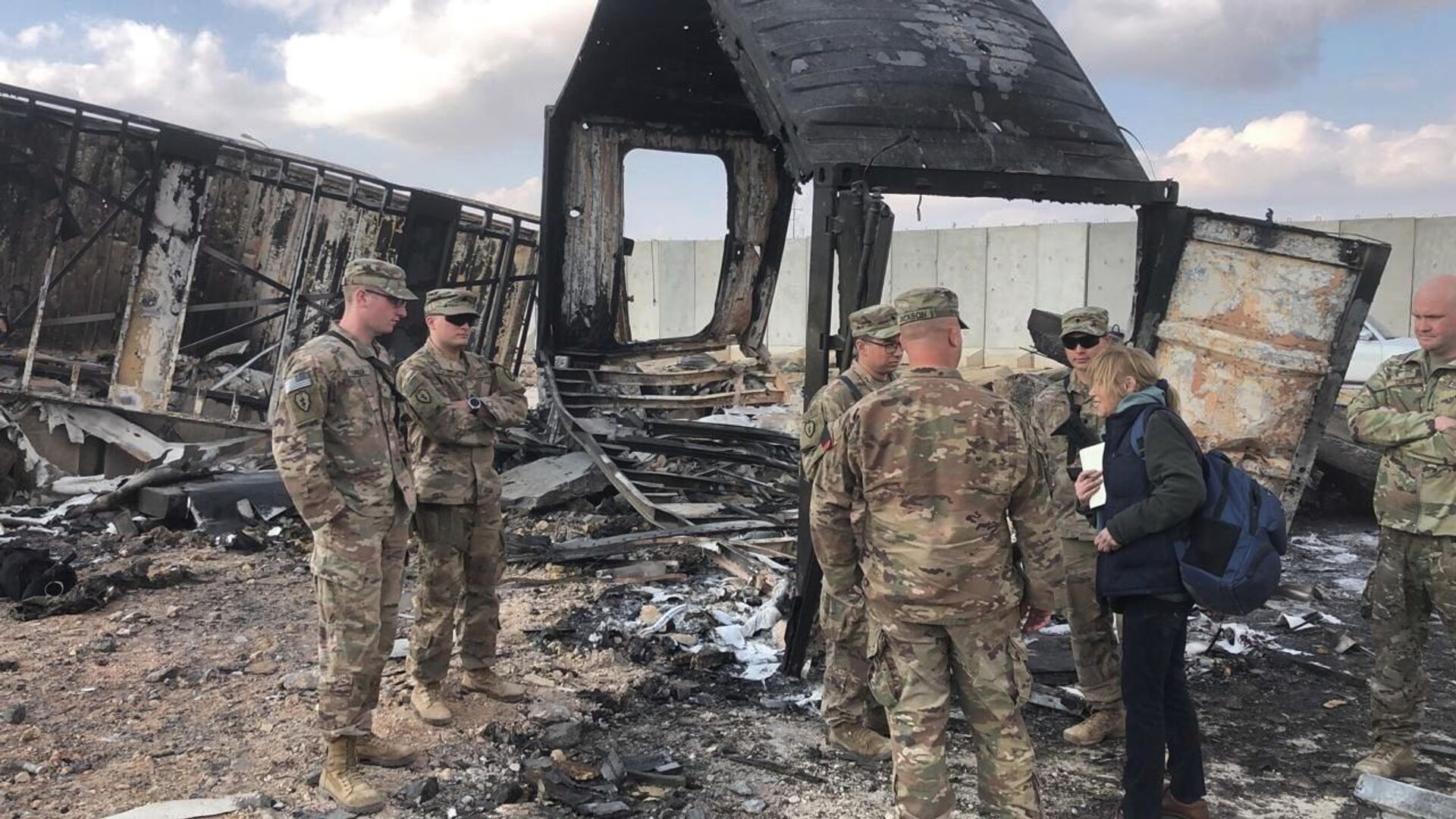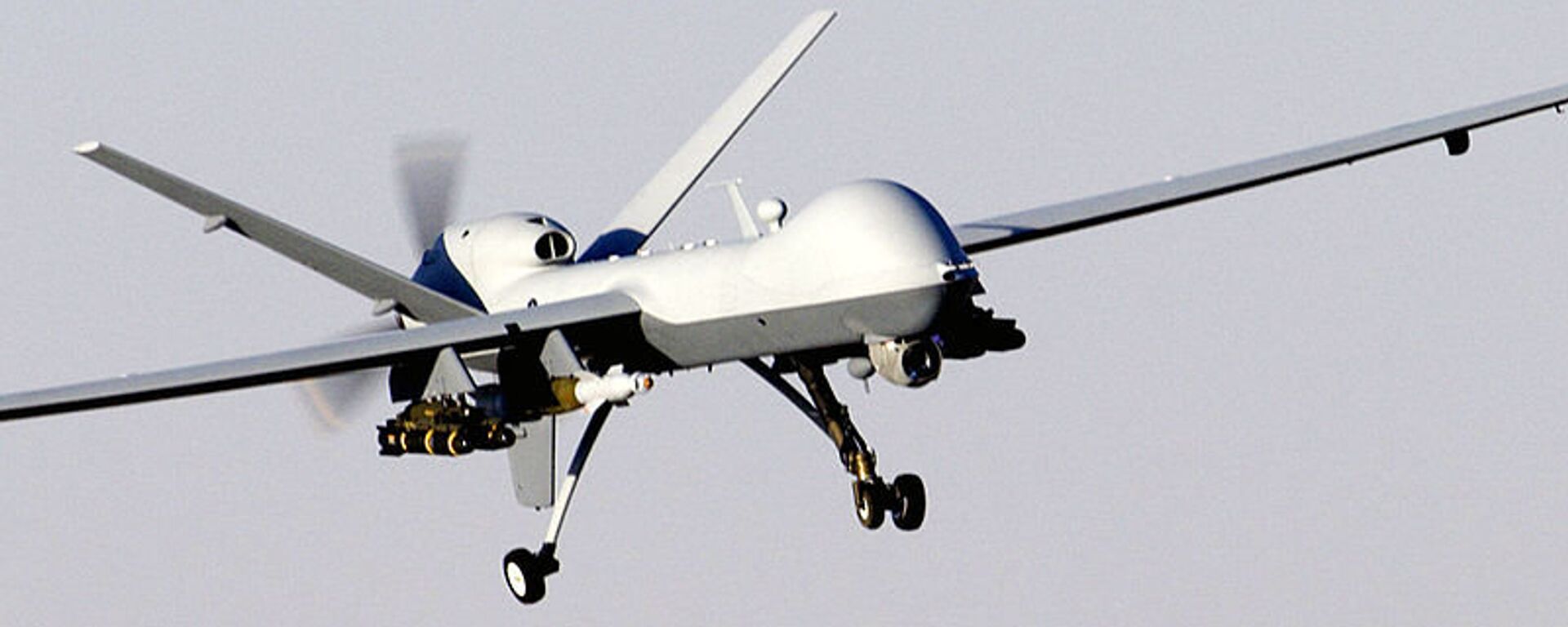https://sputnikglobe.com/20210909/trump-admin-reportedly-asked-pentagon-to-downplay-us-troops-injuries-in-2020-iran-missile-attacks-1088913880.html
Trump Admin Reportedly Asked Pentagon to Downplay US Troops' Injuries in 2020 Iran Missile Attacks
Trump Admin Reportedly Asked Pentagon to Downplay US Troops' Injuries in 2020 Iran Missile Attacks
Sputnik International
In January 2020, Iran targeted two military bases in Iraq hosting US troops in retaliation for the assassination of Islamic Revolutionary Guard Corps (IRGC)... 09.09.2021, Sputnik International
2021-09-09T11:33+0000
2021-09-09T11:33+0000
2023-04-13T12:43+0000
donald trump
us
iran
middle east
iraq
pentagon
https://cdn1.img.sputnikglobe.com/img/107952/34/1079523405_0:0:1280:720_1920x0_80_0_0_ac9c82e90371cc1d33ac64cf0c3b5825.jpg
The Trump administration asked the Pentagon to delay and downplay reports of US troops' injuries in the January 2020 Iranian strike on Iraqi military bases, former defence spokeswoman Alyssa Farah claimed.Speaking to former CNN journalist Michelle Kosinski and the former head of Britain’s MI6 intelligence agency, Sir Richard Dearlove, on the podcast "One Decision", Farah said that the Trump-era White House had asked the Defence Department to refrain from providing regular updates on US soldiers' injuries.Referring to the attack as the "heaviest several hours of my life", Farah noted that the initial assertion by Trump about no casualties in the missile strike was true "at the time that we gave those facts to the president", but the former president appeared to have gone "too far" in an attempt to show that "the Iranians were not successful in harming our targets in response".Farah, however, claimed that she did not yield to the pressure from the White House at the time, saying that she had the feeling that "transparency is always going to be your best friend in that field".Iranian Missile StrikeThe missile attack by Iran was carried out on 8 January 2020, several days after Donald Trump ordered a drone strike that killed IRGC General Qasem Soleimani when the latter was leaving Baghdad Airport.Shortly before targeting the two military bases known to be hosting US soldiers, Tehran warned its Iraqi counterparts, giving them several minutes to prepare for the strikes. The attack left some 110 soldiers with traumatic brain injuries, but did not kill anyone. When asked to estimate the potential seriousness of the injuries, Trump said in February that he had "heard that they [US troops] had headaches" and estimated it was "nothing serious".The assassination of Soleimani, which occurred on 3 January 2020, drew massive backlash not only from Iran, but from many others. Particularly, former UN special rapporteur on extrajudicial, summary, and arbitrary killings, Agnes Callamard, said at the time that the killing was "unlawful" due to Washington's failure to provide evidence of an imminent threat from Soleimani, a high-profile military official who was killed "on the territory of a third, non-belligerent country, and outside a known armed conflict".Tehran has denounced Soleimani's assassination numerous times, dubbing the drone strike against the IRGC general an act of "state terrorism". In July, Iran’s ambassador to the United Nations office in Geneva blasted the Biden administration, noting that Washington's “failure in holding accountable and bringing to justice the perpetrators behind the assassination is explicitly clear”.
https://sputnikglobe.com/20200707/un-investigator-rules-us-killing-of-soleimani-unlawful-implies-that-it-constitutes-act-of-war-1079819691.html
iran
iraq
Sputnik International
feedback@sputniknews.com
+74956456601
MIA „Rosiya Segodnya“
2021
News
en_EN
Sputnik International
feedback@sputniknews.com
+74956456601
MIA „Rosiya Segodnya“
Sputnik International
feedback@sputniknews.com
+74956456601
MIA „Rosiya Segodnya“
donald trump, us, iran, middle east, iraq, pentagon
donald trump, us, iran, middle east, iraq, pentagon
Trump Admin Reportedly Asked Pentagon to Downplay US Troops' Injuries in 2020 Iran Missile Attacks
11:33 GMT 09.09.2021 (Updated: 12:43 GMT 13.04.2023) In January 2020, Iran targeted two military bases in Iraq hosting US troops in retaliation for the assassination of Islamic Revolutionary Guard Corps (IRGC) General Qasem Soleimani. Following the missile attack, over 100 US troops suffered traumatic brain injuries, but there were no deaths.
The Trump administration asked the Pentagon to delay and downplay reports of US troops' injuries in the January 2020 Iranian strike on Iraqi military bases, former defence spokeswoman Alyssa Farah claimed.
Speaking to former CNN journalist Michelle Kosinski and the former head of Britain’s MI6 intelligence agency, Sir Richard Dearlove, on the podcast "One Decision", Farah said that the Trump-era White House had asked the Defence Department to refrain from providing regular updates on US soldiers' injuries.
Referring to the attack as the "heaviest several hours of my life", Farah noted that the initial assertion by Trump about no casualties in the missile strike was true "at the time that we gave those facts to the president", but the former president appeared to have gone "too far" in an attempt to show that "the Iranians were not successful in harming our targets in response".
“And I think that it ended up glossing over what ended up being very significant injuries on US troops after the fact", Farah continued, cited by The Guardian. "We did get pushback from the White House of, ‘Can you guys report this differently? Can it be every 10 days or two weeks, or we do a wrap-up after the fact?’ [...] It was this drip, drip of quote unquote bad news".
Farah, however, claimed that she did not yield to the pressure from the White House at the time, saying that she had the feeling that "transparency is always going to be your best friend in that field".
The missile attack by Iran was carried out on 8 January 2020, several days after Donald Trump ordered a drone strike that killed IRGC General Qasem Soleimani when the latter was leaving Baghdad Airport.
Shortly before targeting the two military bases known to be hosting US soldiers, Tehran warned its Iraqi counterparts, giving them several minutes to prepare for the strikes. The attack left some 110 soldiers with traumatic brain injuries, but did not kill anyone.
When asked to estimate the potential seriousness of the injuries, Trump said in February that he had "heard that they [US troops] had headaches" and estimated it was "nothing serious".
The assassination of Soleimani, which occurred on 3 January 2020, drew massive backlash not only from Iran, but from many others. Particularly, former UN special rapporteur on extrajudicial, summary, and arbitrary killings, Agnes Callamard, said at the time that the killing was "unlawful" due to Washington's failure to provide evidence of an imminent threat from Soleimani, a high-profile military official who was killed "on the territory of a third, non-belligerent country, and outside a known armed conflict".
Tehran has denounced Soleimani's assassination numerous times, dubbing the drone strike against the IRGC general an act of "state terrorism". In July, Iran’s ambassador to the United Nations office in Geneva
blasted the Biden administration, noting that Washington's “failure in holding accountable and bringing to justice the perpetrators behind the assassination is explicitly clear”.




